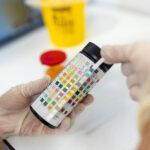Maternal serum screening—what you need to know
Here’s a rundown on Maternal Serum Screening (MSS). Get the […]
Here’s a rundown on Maternal Serum Screening (MSS). Get the facts:

The maternal blood screen, typically performed between the 15th and 17th week of pregnancy, is an optional test that measures four substances—alpha-fetoprotein (AFP), human chorionic gonadotropin (hCG), estriol and inhibin-A—which
are produced by the fetus and placenta.
How does it work?
A blood sample from the mother-to-be is measured for these substances and, by combining the results with the mother’s age and ethnicity, the probability of genetic disorders (including neural tube defects like spina bifida and chromosomal abnormalities such as Down syndrome) is determined.
What other factors can affect the results?
• The date of your pregnancy. Estimating your pregnancy from the first day of your last period can result in inaccurate dating, which may lead to an abnormal screen since the values of the tested substances fluctuate from week to week.
• Placental problems. The baby may be producing normal amounts of these substances, but the placenta may not be filtering them into the bloodstream properly.
• Normal variations. The tested hormone levels might represent a normal variation but be outside what’s considered a “normal” range.
Read our article “Abnormal screening scares“to see how false positives can lead to false alarm.







